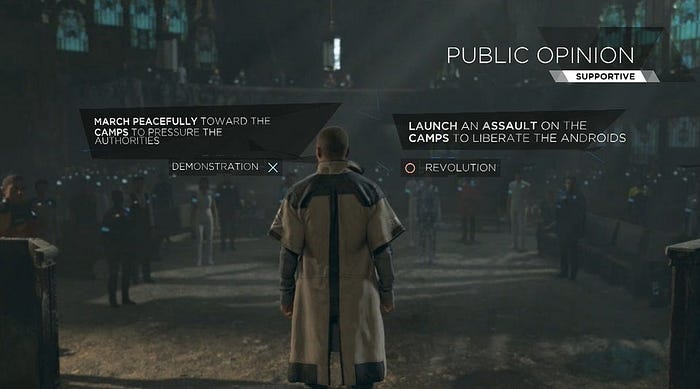How Detroit: Become Human lies to you (piggybacking on Rishi)

I totally thought I was done attacking David Cage and his game Detroit: Become Human on Medium, but Rishi’s post “How Should Games Teach?” (linked here) hits my biggest issue with the game right on the nail.
Detroit is a story-driven game that takes place in the year 2036. It follows the plight of robot servants that look like humans, called androids, and their fight for the end of “slavery”. The game draws many explicit parallels to historical events such as the civil rights movement and the Holocaust.
The player is able to play as the leader of the revolution, an android named Markus. They are given a big choice to either lead a peaceful demonstration or a violent assault to gain android rights.
Rishi argues that “Games, as any other media, have historically been used to further oppressive systems” and describes how games can “attempt to lie to the player, to convince them that the game’s truth is the truth of reality”. Detroit lies to the player by telling them that the morality of revolution is very black and white.
While Detroit allows the player to successfully secure android rights through both a peaceful or violent revolution, it HEAVILY hammers in “peaceful good, violent bad”. The only way to get the Perfect Ending with all major characters alive is to protest peacefully. Choosing to protest violently automatically guarantees the death of at least one major character. By choosing violence, you are barred from the Good Ending, and that is a gross oversimplification of how revolutions work. In the real world, there are times where riots lead to positive change. In no uprising are the oppressed guaranteed safety, and real life does not have purely Good Endings and Bad Endings.
The game ignores the fact that in reality, all revolutions are at risk of casualties, regardless of their nature. Instead, it tells the player that as long as you don’t destroy property or kill anyone, you and all your friends will be okay. This I feel makes the game oppressive; it prescribes truth to the player with no nuance and no option to think otherwise because it is built into the game’s mechanics.
For example, if you make any aggressive decision (like shooting a cop who killed your unarmed comrades or destroying a statue of a “slave” owner), the game displays a giant red arrow indicating “Public Opinion” dropping waaay down. This has a very negative connotation and basically makes the player panic because “oh god, I made The Bad Choice”. The player is not even given a chance to think, “do I personally think this is right or wrong?” because the game decides for them. This also implies that “the public” is a massive hive mind with no complexity or individuality. The arrow is blue and goes up if you do something peaceful, and it’s red and goes down if you’re violent. The game teaches the player that “the public” is that simple.
Rishi talks about how games “allow…a dialogue between the game and the player”, and that’s what makes games great. He says that this dialogue shows the game’s respect for the player and their choices. When I make a stupid choice in a game, something bad happens to me, and I respect that because it was a result of my own action. But when a game takes away that dialogue, it becomes like an insult to the player.
In Detroit, if you choose to lead a violent revolution, your close confidant Josh ALWAYS DIES in the final battle, no matter how tactical you are as a leader and no matter how agile you are with combat sequences. This is a slap in the face to any player who masters the gameplay in the hope to make it out with all their friends alive. This solely serves as a punishment for violence. It is a guarantee built into the game. For a game that really boasts that “your choices matter”, this is a super lame moment. Meanwhile, players who choose to go the peaceful route can very easily keep every character alive and happy because the game classified you a good person and pats you on the back.
Watching Josh’s death made me laugh out loud during my friend’s playthrough. His role throughout the story is very 2-dimensional; basically all he does is pressure Markus to be peaceful. The game is incredibly heavy-handed in its simplistic, black-and-white message of “violence bad”. In Josh’s final moments of robo-life, he manages to weakly utter one final “violence bad” before expiring in Markus’ arms. Menacing, creepy music plays as he tells Markus that he is permanently stained with the blood of the androids who died fighting. Like, does that not apply to the androids who get shot (which they do) if you choose a peaceful demonstration???
Detroit: Become Human lies to the player by preaching an oversimplified “truth” about the very real issues of oppression and revolution. In reality, the process of the oppressed fighting their oppressors is very nuanced and nothing is guaranteed. Assigning a Good Ending and Bad Ending to what is essentially a civil rights movement is dishonest and unrealistic. It’s especially concerning when the game treats itself as a serious and deep social commentary. The game forces “peaceful good, violence ALWAYS bad” onto the player, and judging by its thousands of glowing reviews, it’s working. It disrespects the player’s ability to think critically and develop their own opinion by forcing a bad ending on you if you make a choice white man David Cage thinks is wrong. This makes Detroit: Become Human oppressive.
